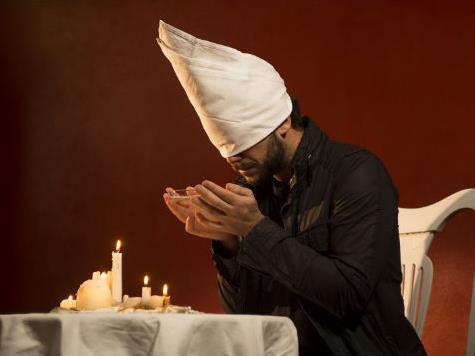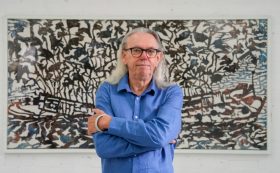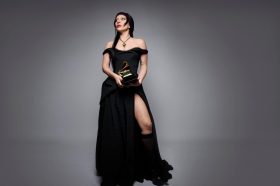When it comes to the arts the eyes and ears have it. These are the two senses regularly engaged with when it comes to channelling a cultural experience.
Yet if successfully harnessed, our other senses can deliver profound and engaging responses that can just as easily realise a creative purpose. A smell can evoke location-specific memories. A taste can induce particular associations. A touch can trigger feelings, such as comfort or shock. By crafting these individual reactions into an artistic framework, a comprehensive multisensory experience can be created.
Due to the inclusive parameters and numerous access points achievable with a multisensory approach, productions and projects exploring these possibilities are highly effective in engaging people with special needs.
Sensorium Theatre is an arts company that creates sensory stimuli performances and residencies for children with disabilities. Earlier this year, Sensorium Theatre, in collaboration with Performing Lines WA, created a multisensory project, The Jub Jub Tree, which gave children with special needs a chance to touch, hear, taste, and smell a story. The sensory-layered narrative allowed participants to engage in multiple creative ways.
Sensory company, Roundangle, also explored the use of smell, taste, touch, sound, and vibration to guide artistic experiences with their recent work Scratch and Sniff. The project was a Sensory Theatre Holiday Program workshop for hearing, deaf, and hard-of-hearing children, co-facilitated by Jodee Mundy and Roundangle Artistic Director Jodie Ahrens. A creative world was built up with the help of a spearmint-scented building and various scented oils, immersing participants in unexpected ways.
While people with special needs can benefit from these inclusive experiences, Ahrens believes that the audience for sensory-spatial projects need not be limited to those who can’t use their eyes or ears. The rest of us also gain from adjusting our reliance on our primary senses.
Ahrens has collaborated with children, immigrant groups, and other artists, as well as fostered partnerships with the Melbourne Museum and the Melbourne Food & Wine Festival in order to introduce a wide and diverse public to what she sees as a more holistic way of being.
‘As sight and sound dominate so much of our experience, the multisensory world invites people to be fully present to the moment and to the ideas that are being offered, often in ways that bypass intellectual interpretation.’
According to Ahrens, smell can be very evocative of memory and emotion. ‘In a lot of performances it can operate on a subconscious level and trigger certain memories and emotions that stimulate thought beyond what is going on in a piece of artwork.’
Intrigued with the possibilities of sensory engagement, Ahrens has embarked on a range of unusual projects that explores this area. Many of these works focus on the sense of smell.
‘Often I work with blindfolds or in darkness, so that immediately heightens the other senses. Another way is to really profile the presence of the sense. For example, in one show instead of using a roast lamb we had the fat and rosemary of a roast lamb on a big platter that arrived at the table…It was very symbolically visual and enabled people to really engage with the smell,’ said Ahrens.
Through Roundangle, Ahrens has completed smell experiments with olfactory experts, performed one-on-one blindfold storyscapes, explored racism relating to food and smell, and instigated sensory deprivation with blacked-out performance spaces for both audience and performer. She has even hosted a dinner in the dark event.
‘That piece was based on a dreamscape and so in the combination of fragmented text, smells, and textures, people could create their own narrative in their own imagination.’
Ahren believes that creating an experience open to interpretation is key to heightening individual response. Memories are highly personal and creating a framework that supports divergent experiences helps maintain engagement.
‘The spaces that we create are generally quite abstract so then people are able to make their own associations with the smell and the other sensory stimulus that we use,’ said Ahrens.
Ahren’s upcoming Melbourne Fringe Festival event Potion, Dining with the Scent of Sins, created in collaboration with Nikki Rydon and long time collaborator Will Tait, takes this into consideration in an event that is less performative and more participant-driven than Roundangle’s previous work.
The event is a fine-dining experience turned it on its ear. Greeted by a Maître d’ and taken to a slightly askew table setting by nonchalant waiters, participants are then given a menu of scents, textures and finally tastes. After they have experienced some of the delicacies on offer, participants can communicate their level of satisfaction verbally and with coloured pencils.
The scents are based on the seven deadly sins, custom designed by South Australian company, One Seed perfumers, and based on a list of given adjectives relating to each vice. Frankincense, pepper, seaweed and even banknotes are just some of the scents utilised in the various arrangements. One Seed perfumes are organic-focused, GMO-free and cruelty-free, allowing participants to take hearty guilt-free sniffs.
To support the experience, sound artist Kirri Buchler has devised a soundscape that uses the harp as a heavenly counterpoint to the wicked menu. This audio landscape will disintegrate over the course of the event as the journey becomes more and more surreal.
For Ahren, Potion, Dining with the Scent of Sins is about generating discourse around sense and its symbolic relationship to concepts or ideas. While participants will control their experience in some ways, they should also prepare for some unexpected manipulations.
‘They (the scents) operate both on a smell-conceptual level in relation to sins and also on a chemical level in the body – using aromatherapy traditions to stimulate bio-chemical responses in the body, whether that be stimulating hunger or a sense of nausea,’ said Ahren.
The event is part of Sensorium, a multi-artist exhibition curated by Anna Briers that will combine this strange dining experience with generative and tactile new media works at Red Gallery.
For Ahrens the event is a chance to show curious punters that a sense of smell can stand alone as a sole gateway to aesthetic response. ‘Something that I’m really compelled by is finding a way where smell becomes a language in itself,’ said Ahrens.
With each smell in Potion having such a distinct and deadly character, this goal may well be in reach.
Potion, Dining with the Scent of Sins will run from 26 to 29 September as part of the Sensorium exhibition at Red Gallery. Bookings for the event can be made through the Melbourne Fringe website.
(Image: ‘Potion, Dining with the Scent of Sins’, Image by Stano Murin [cropped])




